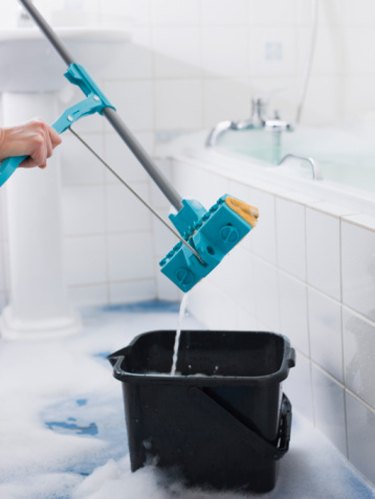Things You'll Need
Bleach
Scouring sponge

Mop buckets vary widely in size and level of complexity, but they all share the same basic function. The more often you mop your floor, the dirtier your mop bucket is likely to be. Establishing a routine of regularly disinfecting your mop bucket is the only way to eradicate the bacteria that collect inside the bucket after each mopping.
Step 1
Wear cleaning gloves when washing mop buckets. Dirty water stored in the buckets can leave behind a residue that may contain bacteria and other contaminants.
Video of the Day
Step 2
Rinse the mop bucket thoroughly with water. In the home, this is best done in the bathroom shower. In a store or office setting, rinse the bucket outside with a hose.
Step 3
Fill the bucket with 1 gallon of water and 3/4 cup of bleach. Omit the bleach and use hot water and vinegar if you use a floor-cleaning solution with ammonia. The combination of ammonia and bleach will produce an extremely toxic gas; do not mix the two chemicals in even the smallest quantities.
Step 4
Allow the bleach solution to sit in the bucket for five minutes.
Step 5
Wash the inside of the bucket with a scouring sponge, scrubbing all chambers and attachments with the bleach mixture.
Step 6
Rinse the bucket with water and tip it upside down so it completely empties.
Step 7
Store the mop bucket on the floor of a closet or storage area. Buckets should be disinfected weekly, but they will still come in contact with some of the filthiest areas of an office or home. Avoid storing other cleaning supplies in your mop bucket unless you are certain it is clean.
Step 8
Empty the bucket each time after you mop; give it a quick rinse with water before putting it away.
Video of the Day